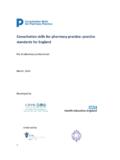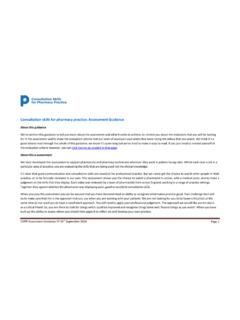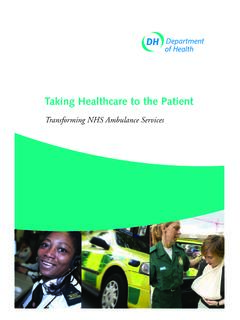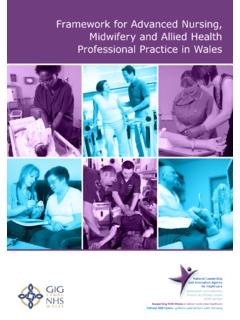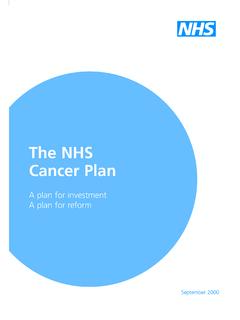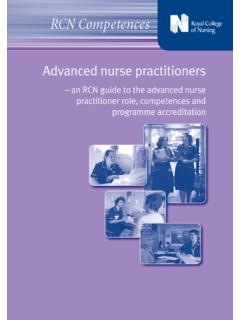Transcription of Consultation skills for pharmacy practice: taking a ...
1 Contacting CPPE. Consultation skills for pharmacy practice: taking a patient-centred approach For information on your orders or bookings, or any general enquiries, please contact us by email, telephone or post. A member of our customer services team will be happy to help you with your enquiry. Consultation skills for Email pharmacy practice: Telephone taking a patient-centred 0161 778 4000. approach By Post Centre for pharmacy Postgraduate Education (CPPE). Manchester pharmacy School A CPPE distance learning programme 1st Floor, Stopford Building The University of Manchester for pharmacy professionals Oxford Road Manchester M13 9PT. Share your learning For information on all our experience with us: programmes and events: email us at visit our website A core learning programme for: Developed by: Funded by: DLP 172. February 2014. Consultation skills for pharmacy practice: taking a patient-centred approach A CPPE distance learning programme for pharmacy professionals A core learning programme for: Educational solutions for the NHS pharmacy workforce Copyright controller HMSO 2014.
2 Ii Acknowledgements Lead writers Lesley Grimes, CPPE senior pharmacist, learning development Nina Barnett, consultant pharmacist, care of older people, East and South East England Specialist pharmacy Services (contributory author for Section 5 Health coaching in patient consultations). Reviewers Leah Davies, clinical development pharmacist, Rowlands pharmacy James Desborough, lecturer in pharmacy practice, University of East Anglia Elizabeth Fidler, principal pharmacy technician, Health Education Kent, Surrey and Sussex - pharmacy Delyth James, senior lecturer, Cardiff University Barry Jubraj, associate professor, Chelsea and Westminster Hospital NHS. Foundation Trust and UCL School of pharmacy Raminder Sihota, senior professional L&D manager, Boots UK. CPPE reviewers Anna Graves, regional tutor, North West Matthew Shaw, deputy director Karen Wragg, regional manager, South Central Thanks The two videos referred to in Section 5 of this programme have been co-produced by Imperial College and London Consortium Television.
3 Thanks go to: Nina Barnett, consultant pharmacist, care of older people Paul Craddock (camera and editor). Zulema Dene (actress). Bartek Dziadosz (camera). Douglas Hing (project advisor). Lis Paice (project lead). We have used some content from the CPPE Patient-centred care open learning programme in this learning programme . CPPE recognises the contribution made by Louise Winstanley and the other contributors and reviewers of that resource. Production Outset Publishing Ltd, Sussex Published in February 2014 by the Centre for pharmacy Postgraduate Education, Manchester pharmacy School, University of Manchester, Oxford Road, Manchester M13 9PT. Contents iii About CPPE distance learning programmes vii About this learning programme x Patient-centred care and pharmacy practice xv What do we mean by a Consultation ? xv The patient-centred Consultation in pharmacy today xvi Putting the patient at the centre of the Consultation xviii Practice points xvii, xix Reflective questions xv, xvii, xx Section 1 Medicines optimisation and medicines adherence 1.
4 Medicines optimisation 1. Understanding medicines adherence 2. The reasons for non-adherence 3. Unintentional and intentional non-adherence 6. Internal and external causes of non-adherence 7. Assessing adherence 10. Self-reporting 10. Discussing adherence with a patient 11. Interventions to improve adherence 13. Considering the needs of different patient groups 14. Older people and adherence 14. Younger patients and adherence 15. Physical or learning disabilities and adherence 16. People with severe mental health problems and adherence 16. Summary and intended outcomes 18. Suggested answers 19. Case study 1 George 12. Case study 2 Rebecca 15. Exercises 2, 4, 7, 9, 17. Practice points 5, 6. Reflective questions 8, 14. F EB R UARY 2014. iv CONTENTS. Section 2 Effective communication 23. Key communication skills 24. Body language 24. Verbal language 27. Listening 27. Basic principles of effective communication 28. Transactional analysis model 29. Barriers to effective communication 32.
5 Telephone consultations 32. Blocking behaviours 34. taking a patient history 37. Tools to support your practice 39. Recording your Consultation 40. Summary and intended outcomes 41. Suggested answers 42. Case study 3 Lily 35. Exercises 25, 30, 40, 41. Practice points 26, 31, 39, 40. Reflective questions 23, 29, 35. Section 3 Consultation models and the theory behind them 44. The history of Consultation theory 45. Bio-medical model 45. Balint theory 46. Transactional analysis model 46. Health belief model 46. Anthropological or folk' model 47. Consultation models and current practice 47. Calgary-Cambridge guide 49. Pendleton's framework 52. Roger Neighbour The inner Consultation (1987) 57. BARD Ed Warren (2002) 57. Consultation styles 59. Summary and intended outcomes 61. Suggested answers 62. Case study 3 Lily revisited 55. Exercises 51, 58. Practice points 58, 60. Reflective questions 45, 48, 52. F EB R UARY 2014. CONTENTS v Section 4 Effective Consultation skills 65.
6 The medication related Consultation framework (MRCF) 66. skills for effective Consultation 71. Initiating the session 71. Gathering information and eliciting the patient's perspective 73. Explanation and planning 80. Closing the session 80. Providing structure 81. Building the relationship 81. Shared decision making 83. Sharing expertise 84. Summary and intended outcomes 90. Suggested answers 91. Case study 3 Lily revisited 86. Exercises 66, 76. Practice points 66, 71, 80, 89. Reflective questions 65, 83, 89. Section 5 Health coaching in patient consultations 93. Health coaching and medicines optimisation 94. The background to health coaching 94. Evidence for health coaching 97. Health promotion and health coaching 98. Medicines adherence and health coaching 98. The skills needed for health coaching 99. Patient factors 100. Health coaching models and medicines adherence 102. GROW 102. The four Es 102. Motivational interviewing 105. OARS 108. Scaling questions 109.
7 Rollnick's top ten useful questions 109. Summary and intended outcomes 111. Suggested answers 112. Case study 1 George revisited 100. Exercises 95, 99, 104, 105, 107, 108, 110. Practice points 94, 105. F EB R UARY 2014. vi CONTENTS. Section 6 Moving your practice forward 114. Consultation models application to practice 115. Key Consultation skills application to practice 116. taking a patient-centred approach application to practice 117. Adopting a health coaching approach to the Consultation 118. Summary and intended outcomes 119. References 120. Tables and figures Figures Figure 1 Example of self-reporting from NICE Clinical 10. guideline CG76. Figure 2 Complementary versus crossed transactions in 30. communication Figure 3 The basic guide 49. Figure 4 Moving towards a patient-centred approach 59. Figure 5 The medication-related Consultation framework 67. (MRCF). Figure 6 Three pillars of health coaching 98. Figure 7 The four Es: supporting ExcEllEncE in medicines 103.
8 Adherence Figure 8 Stages of change model 106. Tables Table 1 Key strategies to support adherence 9. Table 2 Principles of effective communication 28. F EB R UARY 2014. About CPPE distance learning programmes vii About CPPE. The Centre for pharmacy Postgraduate Education (CPPE) offers a wide range of learning opportunities in a variety of formats for pharmacy professionals from all sectors of practice. We are funded through the NHS Multi-professional Education and Training Fund from Health Education England to offer continuing professional development for all pharmacists and pharmacy technicians providing NHS services in England. For further information about our learning portfolio, visit: We recognise that people have different learning needs and not every CPPE. learning programme is suitable for every pharmacist or pharmacy technician. Some of our programmes contain core learning, while others deliver more complex learning that is only required to support certain roles.
9 So we have created three categories of learning CPPE 1 2 3 and allocated each programme to an appropriate category. Core learning (limited expectation of prior knowledge). Application of knowledge (assumes prior learning). Supporting specialisms (CPPE may not be the provider and will signpost you to other appropriate learning providers). This is a learning programme ; however, some of the learning does involve the application of knowledge. Continuing professional development You can use this learning programme to support your continuing professional development (CPD). Consider what your learning needs are in this area. Use your CPD record sheets to plan and record the actions you have taken. F EB R UARY 2014. viii A B O U T C P P E D I S TA N C E L E A R N I N G P R O G R A M M E S. Activities Exercises We include exercises throughout this programme as a form of self-assessment. Use them to test your knowledge and understanding of key learning points. Practice points Practice points are an opportunity for you to consider your practical approach to the effective care of patients or the provision of a service.
10 They are discrete activities designed to help you to identify good practice, to think through the steps required to implement new practice, and to consider the specific needs of your local population. We have designed the practice points in this programme to help you and your team to make links between the learning and your daily practice and to co-ordinate with other healthcare professionals. Case studies We base case studies on actual or simulated events. They are included to help you to interpret protocols, deal with uncertainties and weigh up the balance of judgements needed to arrive at a conclusion. We design the case studies to prepare you for similar or related cases that you may face in your own practice. Reflective questions These questions are included to give you an opportunity to pause and reflect on your current practice and skills throughout the programme . Thinking about these questions will help you to meet the objectives of the programme and will extend and reinforce your learning.
